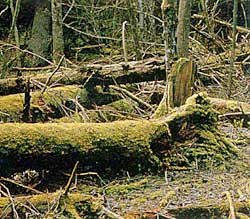 Lake Temagami, Canada: The forest around this deep, clear body of water is thick and alive with evil. At least, that is, if you regard voracious insects as enemies of the human species, as I do. From a cabin near the shore, I take a daily walk through stands of pine and poplar trees, some of them soaring skyward 60 metres or more, creaking in the chill winds off the lake. From time to time, I stumble upon the remnants of a bygone age-mysterious bits of iron and old wooden structures, sometimes with the appearance of being intact, but long since turned into shells or skeletons by weather or those insects.
Lake Temagami, Canada: The forest around this deep, clear body of water is thick and alive with evil. At least, that is, if you regard voracious insects as enemies of the human species, as I do. From a cabin near the shore, I take a daily walk through stands of pine and poplar trees, some of them soaring skyward 60 metres or more, creaking in the chill winds off the lake. From time to time, I stumble upon the remnants of a bygone age-mysterious bits of iron and old wooden structures, sometimes with the appearance of being intact, but long since turned into shells or skeletons by weather or those insects. What I walk through is what used to be a logging camp, a veritable village in its day, about 100 years ago. Now abandoned and withered, a human settlement is being slowly reclaimed by nature. There's not much that's visible to the questing eye. If I hadn't stubbed my toe on a corroded but still sharp steel saw blade, this former abode of hard-working, hard-living loggers might have remained in sylvan obscurity until it rotted into its component parts; forest food for the trees its inhabitants used to rip from the soil and turn into profits for some faraway lumber baron.

For that's what the men who exploited the forests of northern Canada were-barons all, extremely rich, savvy, powerful people who oversaw the economy of half a continent. In the halcyon days when this region 400 km from the American border produced the fine woods needed to build cities and lifestyles across the hemisphere, the lumber barons called the shots in national politics. They grew wealthy and influential even as they ripped irreplaceable natural wealth from the thin soil over the Precambrian granite of an exposed earth's crust.
Aside from saw blades and old buildings, they and their workers left behind the trappings of a now-departed antique culture-horse harnesses, skies for sledges to slide heavy logs through winter snow, metal candle holders and kerosene lamps, nails forged square instead of round. Don't let the roughness and crudity of the remaining bits deceive you. From what I see, and what I've read, lumber was the oil of the 19th and early-20th centuries around here. When the last of the big 300-year-old trees had been cut down, the barons and the workers moved on to other places-warmer parts of Canada, Borneo, Brazil. They found other natural resources to unsustainably exploit too.
I wondered as I shuffled through the undergrowth with my throbbing toe whether or not this natural reclamation process wasn't a way of humbling over-arrogant humans. Each generation that enjoys a modicum of political and economic success seems to think itself the most significant, accomplished, and advanced ever. Yet time and tide wait for no one, and all things pass. The lumber boom means little now, at least here, and no one would compare the wealth of the forest to the gushing oil wells of the Gulf anymore.
But I do. How can I avoid thinking about how much better off things might be if the vast petroleum reserves under the region that Orientialists call the Middle East were exhausted, and the deserts of Saudi Arabia's empty quarter and Iran's coast were slowly overwhelming the rusting works of men that used to fill the world's thirsty petrol tanks. Not because I'm a Luddite who hates the progress that has been underwritten by oil's high prices, but because of the horrible skewing effects of dependency on finite natural resources on social, political and economic development. And in the case of oil, that ill-effect extends far beyond the comfortable corruptions of the Gulf kingdoms into Israel, Africa, Asia and other places.
I know, I know. The columnist on holiday runs the risk of seeking profundity where he needs to find it-even in the foam on the top of a beer glass, or so I'm told. But that image of the howling desert wind and swirling dust burying the oil derricks is a powerful one. It bears more than a passing resemblance to insight. Just be careful you don't stub your toe on a piece of oil derrick sticking out of the sand.



